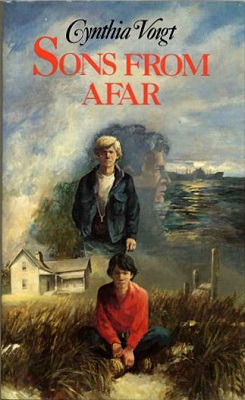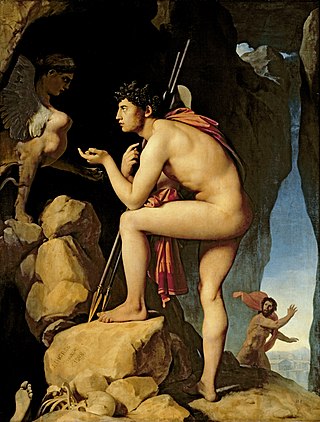The id, ego and superego are the three different, functionally interlocking main components of the human soul, as investigated and defined by Sigmund Freud. They represent the structural model of psychoanalysis. Freud himself used the German terms das Es, Ich, and Über-Ich. The Latin terms id, ego and superego were chosen by his original translators and have remained in use. The terms soul and psyche here are synonymous in the sense of the human organism as a whole, focussing on the mental aspect without any option of concrete separability from matter and therefore in strict distinction to the religious concept of "soul".
Castration anxiety is an overwhelming fear of damage to, or loss of, the penis—a derivative of Sigmund Freud's theory of the castration complex, one of his earliest psychoanalytic theories. The term refers to the fear of emasculation in both a literal and metaphorical sense.
Mother's boy, also commonly and informally mummy's boy, mommy's boy or mama's boy, is a derogatory term for a man seen as having an unhealthy dependence on his mother at an age at which he is expected to be self-reliant. Use of this phrase is first attested in 1901. The term mama's boy has a connotation of effeminacy and weakness. The counter term, for women, would be a father complex.
Cynthia Voigt is an American writer of books for young adults dealing with various topics such as adventure, mystery, racism and child abuse. Her first book in the Tillerman family series, Homecoming, was nominated for several international prizes and adapted as a 1996 film. Her novel Dicey's Song won the 1983 Newbery Medal.

In Freudian psychoanalysis, the phallic stage is the third stage of psychosexual development, spanning the ages of three to six years, wherein the infant's libido (desire) centers upon their genitalia as the erogenous zone. When children become aware of their bodies, the bodies of other children, and the bodies of their parents, they gratify physical curiosity by undressing and exploring each other and their genitals, the center of the phallic stage, in the course of which they learn the physical differences between the male and female sexes and their associated social roles, experiences which alter the psychologic dynamics of the parent and child relationship. The phallic stage is the third of five Freudian psychosexual development stages: (i) the oral, (ii) the anal, (iii) the phallic, (iv) the latent, and (v) the genital.
The castration complex is a concept developed by Sigmund Freud, first presented in 1908, initially as part of his theorisation of the transition in early childhood development from the polymorphous perversity of infantile sexuality to the ‘infantile genital organisation’ which forms the basis for adult sexuality. The trauma induced by the child’s discovery of anatomical difference between the sexes gives rise to the fantasy of female emasculation or castration.
In psychoanalysis, psychosexual development is a central element of the sexual drive theory. According to Freud, personality develops through a series of childhood stages in which pleasure seeking energies from the child become focused on certain erogenous areas. An erogenous zone is characterized as an area of the body that is particularly sensitive to stimulation. The five psychosexual stages are the oral, the anal, the phallic, the latent, and the genital. The erogenous zone associated with each stage serves as a source of pleasure. Being unsatisfied at any particular stage can result in fixation. On the other hand, being satisfied can result in a healthy personality. Sigmund Freud proposed that if the child experienced frustration at any of the psychosexual developmental stages, they would experience anxiety that would persist into adulthood as a neurosis, a functional mental disorder.

Dicey's Song is a novel by Cynthia Voigt. It won the Newbery Medal for excellence in American children's literature in 1983.

Feminists have long struggled with Sigmund Freud's classical model of gender and identity development, which centers on the Oedipus complex. Freud's model, which became integral to orthodox psychoanalysis, suggests that because women lack the visible genitals of the male, they feel they are "missing" the most central characteristic necessary for gaining narcissistic value—therefore developing feelings of gender inequality and penis envy. In his late theory on the feminine, Freud recognized the early and long lasting libidinal attachment of the daughter to the mother during the pre-oedipal stages. Feminist psychoanalysts have confronted these ideas and reached different conclusions. Some generally agree with Freud's major outlines, modifying it through observations of the pre-Oedipal phase. Others reformulate Freud's theories more completely.
Love and hate as co-existing forces have been thoroughly explored within the literature of psychoanalysis, building on awareness of their co-existence in Western culture reaching back to the “odi et amo” of Catullus, and Plato's Symposium.

Homecoming is a 1981 young adult novel by American children's author Cynthia Voigt. It is the first of seven novels in the Tillerman Cycle. It was adapted into a television film.

Sons From Afar (1987) is the sixth book in Cynthia Voigt's Tillerman Cycle, the series of novels dealing with Dicey Tillerman's family which also includes Homecoming, Dicey's Song, The Runner, A Solitary Blue, Come A Stranger, and Seventeen Against the Dealer.
The Tillerman Cycle is a series of children's novels by the author Cynthia Voigt. Currently there are seven titles in the series.
The Blacky pictures test was a projective test, employing a series of twelve picture cards, used by psychoanalysts in mid-20th century America and elsewhere, to investigate the extent to which children's personalities were shaped by Freudian psychosexual development.

Seventeen Against the Dealer is a young adult novel by the American children's author Cynthia Voigt. It is the last of seven novels in the Tillerman Cycle.

In neo-Freudian psychology, the Electra complex, as proposed by Swiss psychiatrist and psychoanalyst Carl Jung in his Theory of Psychoanalysis, is a girl's psychosexual competition with her mother for possession of her father. In the course of her psychosexual development, the complex is the girl's phallic stage; a boy's analogous experience is the Oedipus complex. The Electra complex occurs in the third—phallic stage —of five psychosexual development stages: the oral, the anal, the phallic, the latent, and the genital—in which the source of libido pleasure is in a different erogenous zone of the infant's body.

In classical psychoanalytic theory, the Oedipus complex refers to a son's sexual attitude towards his mother and concomitant hostility toward his father, first formed during the phallic stage of psychosexual development. A daughter's attitude of desire for her father and hostility toward her mother is referred to as the feminine Oedipus complex. The general concept was considered by Sigmund Freud in The Interpretation of Dreams (1899), although the term itself was introduced in his paper A Special Type of Choice of Object made by Men (1910).
Penis envy is a stage in Sigmund Freud's theory of female psychosexual development, in which young girls experience anxiety upon realization that they do not have a penis. Freud considered this realization a defining moment in a series of transitions toward a mature female sexuality. In Freudian theory, the penis envy stage begins the transition from attachment to the mother to competition with the mother for the attention and affection of the father. The young boy's realization that women do not have a penis is thought to result in castration anxiety.

In psychoanalytic theory, the Jocasta complex is the incestuous sexual desire of a mother towards her son.

Sigmund Freud is considered to be the founder of the psychodynamic approach to psychology, which looks to unconscious drives to explain human behavior. Freud believed that the mind is responsible for both conscious and unconscious decisions that it makes on the basis of psychological drives. The id, ego, and super-ego are three aspects of the mind Freud believed to comprise a person's personality. Freud believed people are "simply actors in the drama of [their] own minds, pushed by desire, pulled by coincidence. Underneath the surface, our personalities represent the power struggle going on deep within us".









